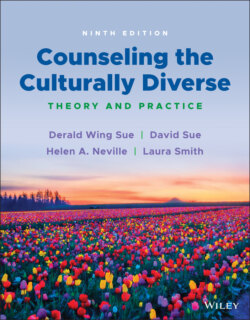Читать книгу Counseling the Culturally Diverse - Laura Smith L. - Страница 109
BY THE NUMBERS
ОглавлениеAfrican Americans experience frequent microaggressions in their daily lives:
32% of Black adults said people behaved as if they were “better than you.”
27% of people acted as if they were afraid of them.
23% of people acted as if Blacks were dishonest.
With the rise in Anti‐Asian sentiment in the United States, the experience of microaggressions by this group has also increased.
3,800 hate crimes were recorded against AAPI groups from March 2020–February 2021. Although hate crimes are not racial microaggressions, they are harbingers of implicit bias.
31% of Asian Americans reported they were objects of racial slurs and jokes.
64% believe the political rhetoric (reference to Covid‐19 as the Wuhan virus, China virus, and Kungflu) unmasked beliefs that AAPI groups are foreigners and blamed.
67% of adults, and 47% of youth were concerned with their safety.
Sources: Asian American Psychological Association (2021); Gallup Poll (2020).
To further illustrate the concepts of microinsults and microinvalidations, Table 4.1 provides some common examples, as well as their accompanying hidden messages and assumptions. Some of these categories are more applicable to certain forms of microaggression (racial, gender, religion, ability, or sexual orientation), but they all seem to share commonalities.
